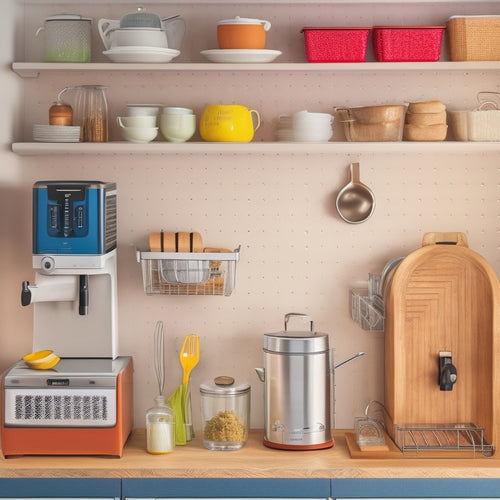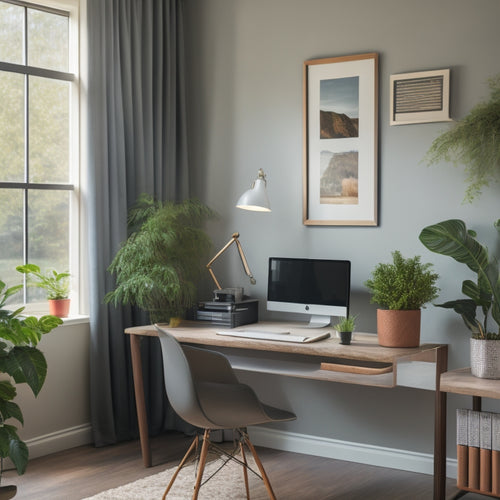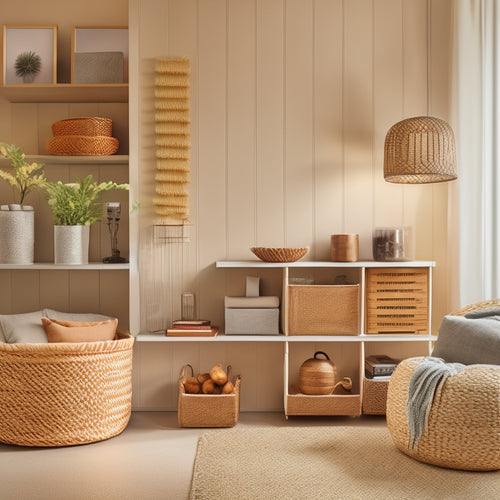
What's Holding You Back From a Clutter-Free Home?
Share
You're likely no stranger to the frustration of wanting a clutter-free home, but somehow, it always seems just out of reach. Unrealistic expectations of perfection, lack of storage space solutions, and an inability to let go of sentimental items might be holding you back. Maybe you're stuck without a clear organizing system, or procrastination and busy schedules keep you from tackling clutter. Additionally, unhealthy emotional attachments, inadequate time management skills, and a limited budget for organization tools might be contributing to the chaos. It's time to identify your specific obstacles and start tackling them one by one - and you're about to discover exactly how.
Key Takeaways
• Unrealistic expectations of perfection and societal pressure for spotless homes can hinder efforts to achieve a clutter-free home.
• Limited storage space and inadequate organizing systems can lead to clutter hotspots and disorganization.
• Emotional attachment to items with sentimental value makes it difficult to let go of clutter and achieve a clutter-free home.
• Procrastination, busy schedules, and inadequate time management skills can prevent individuals from dedicating time to decluttering and organizing.
• Limited budgets for organization tools and lack of creative solutions can make it challenging to find effective storage and decluttering solutions.
Unrealistic Expectations of Perfection
Setting unrealistic expectations of perfection can lead you to feel like a failure, even when your home is tidy and organized, because you're comparing your reality to a flawless, photoshopped ideal. You're not alone in this struggle. The perfection pressure to have a spotless home can be overwhelming, causing self-doubt to creep in. You start to wonder if you're doing something wrong or if you're just not good enough.
The comparison trap is real, and it's fueled by societal standards that promote unrealistic beauty and perfection. Social media platforms showcase perfectly styled homes, making it easy to fall into the trap of comparison. You start to think that everyone else has their life together, except you. But the truth is, nobody posts pictures of their messy homes or chaotic lives.
It's crucial to remember that perfection is subjective and unattainable. Your home doesn't have to be perfect; it just needs to be functional and comfortable for you and your family. By letting go of unrealistic expectations, you can break free from the cycle of self-doubt and focus on creating a space that truly reflects your lifestyle.
Lack of Storage Space Solutions
With a few simple tweaks, you can turn clutter hotspots into functional storage spaces that make your daily routine easier to manage. One of the main obstacles to a clutter-free home is the lack of storage space solutions. This can lead to clutter piling up in areas like entryways, kitchens, and bathrooms. However, by implementing creative organization and space saving solutions, you can reclaim these areas and make them work for you.
Here are a few ideas to get you started:
-
Install shelves and hooks: Maximize vertical space by installing shelves and hooks to hang items like jackets, bags, and accessories.
-
Use multi-functional furniture: Invest in furniture pieces that serve multiple purposes, such as an ottoman with storage or a desk with built-in shelving.
-
Opt for stackable containers: Use stackable containers or bins to store items like linens, toys, or cleaning supplies, keeping them out of sight and out of mind.
Inability to Let Go of Items
You're not alone in struggling to part with certain items, as emotional attachment and sentimental value can make it tough to let go.
You might find yourself holding onto things that remind you of happy memories or significant events, even if they no longer serve a practical purpose.
As you work towards a clutter-free home, recognizing and dealing with these emotional barriers to decluttering is crucial.
Emotional Attachment Issues
Emotional attachment to possessions can be a major hurdle in your decluttering journey, as sentimental value often clouds your judgment, making it challenging to part with items that no longer serve a purpose. You're not alone in this struggle; many people face attachment struggles when trying to declutter.
Recognizing that emotional ties to items are normal, but they shouldn't hinder you from achieving your organizing goals.
Take a closer look at the items you're struggling to let go of. Ask yourself:
-
Does it bring you joy or serve a practical purpose?
-
Is it a reminder of a happy memory, or is it holding you back from creating new ones?
-
Would keeping it truly benefit your life, or is it just taking up space?
Sentimental Value Overload
As you stand amidst the clutter, surrounded by items that hold sentimental value, recognizing that the inability to let go of these possessions is often rooted in a deep-seated fear of losing the memories or emotions attached to them is vital. You're not just holding onto stuff; you're holding onto the feelings and experiences tied to those items.
This sentimental struggle can lead to a clutter dilemma, making it difficult to part with even the smallest trinket.
You're not alone in this struggle. Many people face a memory overload, where the sheer volume of sentimental items becomes overwhelming. It's crucial to acknowledge that the memories themselves aren't tied to the physical objects. You can still cherish the memories without keeping every item.
Start by identifying the most meaningful possessions and find ways to preserve the memories without keeping the physical item. For instance, take a photo of the item or write a story about the memory attached to it. By doing so, you'll begin to tackle the declutter challenge and create a more balanced relationship between your possessions and emotions.
No Clear Organizing System
Your daily routine is likely hindered by the absence of a clear organizing system, which leads to wasted time searching for misplaced items and a perpetual sense of disarray. Without a structured approach, clutter accumulates, and your home becomes a breeding ground for chaos.
To break free from this cycle, establishing a clear organizing system is crucial.
Here are three key elements to get you started:
-
Sorting Strategies: Develop a categorization method that works for you, such as grouping similar items together or separating items by frequency of use.
-
Labeling Techniques: Use clear and concise labels to identify what's inside containers or on shelves, making it easy to locate items when needed.
-
Decluttering Tips and Storage Solutions: Implement a 'one in, one out' policy to maintain a balanced level of possessions, and invest in storage solutions that maximize space and keep items organized.
Procrastination and Busy Schedules
You're likely no stranger to procrastination, and it's probably safe to say that your busy schedule often gets in the way of tackling that growing to-do list, let alone maintaining a clutter-free home. It's crucial to put off tasks, especially when they seem overwhelming or time-consuming. However, procrastination can lead to more stress and clutter in the long run.
| Current Situation | Desired Outcome |
|---|---|
| Putting off tasks until the last minute | Breaking tasks into manageable chunks |
| Feeling overwhelmed by clutter | Creating a schedule for regular decluttering sessions |
| Letting clutter build up over time | Implementing a 'one-touch' rule for dealing with clutter |
To overcome procrastination and busy schedules, it's vital to develop effective time management skills. Start by prioritizing tasks, focusing on the most critical ones first. Break down large tasks into smaller, manageable chunks, and allocate specific times for each task. By doing so, you'll be able to make steady progress towards your goal of a clutter-free home. Remember, every small step counts, and consistency is key.
Unhealthy Emotional Attachments
Many possessions hold sentimental value, making it challenging to part with them, even if they no longer serve a practical purpose. You may be holding onto items that remind you of happy memories, significant events, or loved ones. These emotional attachments can make it difficult to declutter, but acknowledging that the memories and emotions aren't tied to the physical object itself is vital.
Here are a few examples of items that may be holding you back:
-
Your grandmother's antique vase: It's beautiful, but it no longer fits your personal style, and you haven't used it in years.
-
Your child's artwork from kindergarten: It's sweet, but you have dozens of similar pieces taking up valuable space.
-
Your wedding dress: It's a treasured keepsake, but it's taking up an entire closet, and you'll never wear it again.
Recognizing these emotional attachments is the first step towards healing and releasing them. By letting go of these items, you're not erasing the memories or emotions attached to them. Instead, you're creating space for new experiences and memories while allowing yourself to heal and move forward.
This emotional release can be liberating and is an integral part of achieving a clutter-free home.
Inadequate Time Management Skills
When you're struggling to keep your home clutter-free, it's often because you're not making the most of your time. You're probably juggling multiple tasks at once, leaving you feeling overwhelmed and stuck.
Prioritize Task Effectively
To achieve a clutter-free home, prioritizing tasks effectively is imperative, as insufficient time management skills can lead to a never-ending cycle of chaos and disorganization. You might feel overwhelmed, stuck, and unsure where to start. But, by prioritizing tasks, you'll regain control and make progress towards your goal.
Here are three key areas to focus on:
-
Identify your most important tasks: What needs to be done first? What tasks will have the greatest impact on your space? Focus on these high-priority tasks to make the most of your time.
-
Break tasks into manageable chunks: Divide large tasks into smaller, actionable steps. This will help you stay focused and avoid feeling overwhelmed.
-
Eliminate distractions: Identify time-wasting activities that hinder your progress, such as social media or email checks, and eliminate them while you work.
Create Realistic Schedule
Set aside dedicated blocks of time for decluttering and organizing, and stick to them, so you can make consistent progress towards your clutter-free home goal. Effective time management is vital to achieving this goal. Without a realistic schedule, you'll struggle to find the time to declutter and organize, leading to frustration and procrastination.
Create a schedule that works for you, not against you. Be realistic about how much time you can dedicate to decluttering and organizing each week.
Break down larger tasks into smaller, manageable chunks, and allocate specific times for each task. This will help you stay focused and avoid feeling overwhelmed.
Limited Budget for Organization Tools
Organizing on a shoestring budget requires getting creative with items you already own or finding affordable alternatives that won't break the bank. You don't need to spend a fortune on fancy storage systems or trendy decor to achieve a clutter-free home.
Here are a few DIY organization ideas to get you started:
-
Repurpose old containers: Use empty jars, bins, or boxes to store small items like buttons, safety pins, or beads. Label them so you can easily find what you need.
-
Utilize vertical space: Maximize your wall space by installing shelves, hooks, or a pegboard to hang items like bikes, bags, or accessories.
-
Create a 'launching pad': Designate a spot near the entrance of your home as a 'launching pad' where you can place your keys, wallet, and other essentials, keeping them organized and within reach.
Frequently Asked Questions
How Can I Get My Family Members to Maintain the Organized Space?
You'll get your family members to maintain the organized space by involving them in the process, setting consistent reminders, and setting boundaries while finding collaborative solutions that work for everyone, making it a team effort.
Can I Still Be Organized if I'm Not a Naturally Tidy Person?
You can still be organized even if you're not naturally tidy, by developing personal habits like daily maintenance and implementing effective organization strategies that work for you, not against your nature.
How Do I Handle Clutter That's Not Mine, Like a Roommate's or Partner's?
"Interestingly, you're more likely to tolerate clutter that's not yours, but don't! Set boundaries, communicate with your roommate or partner, and find a compromise that works for shared spaces - it's about respect, not control."
Is It Possible to Organize a Small or Irregularly Shaped Room?
You can absolutely organize a small or irregularly shaped room by embracing creative storage solutions, maximizing space, and utilizing vertical organization techniques to make the most of every nook and cranny.
Will I Need to Get Rid of Everything to Have a Clutter-Free Home?
You're not required to adopt a minimalist lifestyle or bid adieu to all sentimental items; instead, learn effective decluttering techniques and clever storage solutions to thoughtfully curate your belongings and create a peaceful space that feels truly yours.
Related Posts
-

Smart Storage for Small Kitchen Appliances
You can optimize your small kitchen's functionality by implementing smart storage solutions that efficiently stash sm...
-

Master Your Space With Digital Decluttering Tools
You're tired of feeling overwhelmed by digital clutter, wasting time searching for lost files, and struggling to focu...
-

Effortless Home Organization Systems for Busy Families
You can create an effortless home organization system that caters to your busy family's unique needs and routines. St...


